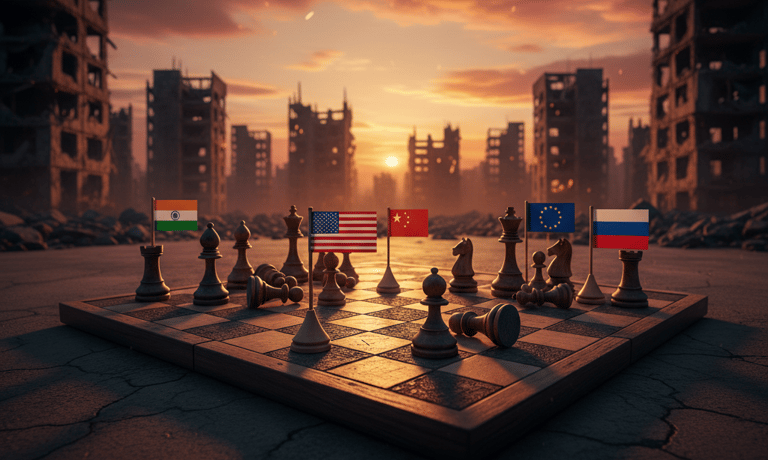The Great Game in Ukraine: Who is Fighting Whom, and For What Cause?
Self National-Interest Dictate Every Move on the Global Chess Board


The images from Ukraine are stark: cities reduced to rubble, millions displaced, a humanitarian catastrophe unfolding daily. On the surface, it’s a clear-cut conflict: Russia, the aggressor, has invaded its sovereign neighbor, Ukraine. But scratch beneath the headlines, and you quickly realize that the battlefield extends far beyond Ukraine's borders, involving a complex web of global powers, competing interests, and a distressing scarcity of consistent principles.
So, who is truly fighting whom, and for what cause? Is it genuinely a war for democracy and sovereignty, or a new chapter in the perennial saga of national self-interest disguised as moral righteousness?
The Stated Conflict: Russia vs. Ukraine
At its core, the conflict is a Russian war of aggression against Ukraine. Moscow claims it is a "special military operation" to "demilitarize" and "denazify" Ukraine, and to protect Russian-speaking populations. These pretexts have been widely dismissed by the international community. For Ukraine, it is an existential fight for its very survival, its independence, and the right to self-determination.
The Wider Players: US and EU – Principled Saviors or Strategic Pragmatists?
The United States and the European Union have emerged as Ukraine's staunchest supporters, pouring billions in financial aid, military hardware, and humanitarian assistance. Their narrative is clear: they are defending a rules-based international order, democratic values, and the principle of national sovereignty against blatant aggression.
Yet, a closer look reveals layers of complexity and perceived hypocrisy:
Sanctions vs. Self-Interest: While aggressively sanctioning Russia, both the US and EU continue to import critical goods from the very nation they seek to cripple. The US still relies on Russian uranium for its nuclear power plants, and Europe, though reducing its dependency, has historically been deeply intertwined with Russian energy. This isn't necessarily malice; it's the cold reality of national interest – ensuring domestic energy security and avoiding economic collapse often trumps a complete, immediate moral stance.
The China Conundrum: The US maintains a significant trade relationship with China, yet simultaneously pressures the EU to impose sanctions on Beijing. This appears to be a clear case of "do as I say, not as I do," highlighting a pragmatic approach to economic engagement where American interests dictate the terms, even for its allies.
"Modi's War" and the Global South: When India, a democratic nation and crucial global partner, chooses to maintain trade ties with Russia (including importing discounted oil) rather than fully align with Western sanctions, it draws criticism. The US, in particular, has at times branded it as "Modi's war" – a term reflecting frustration but also ignoring India's own complex national interests and its long-standing relationship with Moscow. The proposed 25% extra tariff on India for importing Russian oil further exemplifies a transactional approach, where deviations from the Western line incur penalties.
The Altruism Question: Is Support for Ukraine Purely Principled?
While the defense of Ukraine's sovereignty is a powerful moral cause, the support from the US and EU is far from purely altruistic. It aligns directly with significant strategic and national interests:
Weakening a Rival: A weakened Russia, bogged down and economically isolated, serves the long-term geopolitical interests of the US and EU by diminishing a major strategic competitor.
Reinforcing Alliances: The war has reinvigorated NATO and solidified the Western alliance, providing a renewed sense of purpose against a common foe.
Shaping the Global Order: Upholding the principle of territorial integrity (when convenient) helps maintain a global order that generally favors established Western powers.
The Elephant in the Room: A History of Interventions and Hypocrisy
The most biting critique leveled against the Western powers comes from their own historical record. The US, in particular, has a long and undeniable history of military interventions in sovereign nations – from Vietnam and Latin America to Iraq and Afghanistan – often without explicit UN mandates and based on pretexts of "perceived threats" or "humanitarian concerns."
When the US and EU now demand unwavering adherence to international law from others, many nations, especially those who have experienced such interventions, see a glaring hypocrisy. They question the moral authority of those who have, in the past, bypassed or reinterpreted international norms when their own "national interests" dictated. This past baggage severely complicates the efforts to build a truly global consensus against Russia.
The Transactional Future: Ukraine's Minerals
Adding another layer to the national interest argument is Ukraine's vast mineral wealth. Ukraine possesses significant reserves of critical minerals like lithium, titanium, and rare earth elements – crucial for modern technology, green energy, and defense industries. As the war continues, the US and European entities are already positioning themselves to invest in and help develop Ukraine's mineral sector. This highlights a transactional component: rebuilding Ukraine offers a strategic opportunity to secure vital resources, reducing dependence on rivals like China.
Conclusion: National Interests, Always at the Core
Ultimately, Beyond the immediate conflict, Ukraine has become the contested board in a grand game of international chess, with world powers strategically positioning their flags for economic gain, enhanced security, and enduring influence. Principles, while voiced, often serve as tactical gambits or convenient rationales, aligning with moves that are, at their core, meticulously designed to advance each player's self-interest. They frequently act as powerful opening moves or defensive strategies, legitimizing actions fundamentally engineered to safeguard and propel a nation's own core interests. In this high-stakes game, even as high ideals are loudly championed each passing day, the underlying drive for national advantage consistently determines action, rendering pure altruism and unwavering consistency mere sidelines.
